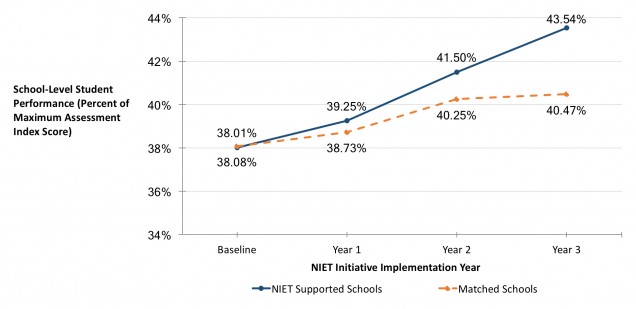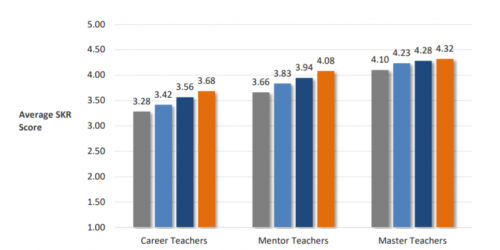NIET Presents at AERA 2019
April 4, 2019

Six presentations support implementation of systemic education reform to improve instruction and student achievement growth
The National Institute for Excellence in Teaching presented six studies throughout the annual meeting of the American Educational Research Association (AERA)—the nation's largest education research society. Taking place in Toronto, the event is the world's largest gathering of education researchers and illuminates groundbreaking solutions to advance improvements in education.
All presentations at AERA's annual meeting go through a highly selective process based on their depth and rigor. NIET's studies this year are:
Unified Voices: National Survey of Educators’ Perceptions of Teacher Practices
Friday, April 5, 2:25 - 3:55 p.m.
Metro Toronto Convention Centre, 700 Level, Room 704
When efforts to improve instruction are centered around building local capacity and giving teachers structured supports along the way, everyone benefits. According to a study of some 6,000 teachers and principals from more than 180 schools implementing the TAP System for Teacher and Student Advancement across eight states, educators report favorable opinions of a multifaceted approach. TAP's core elements involve teacher leadership, ongoing job-embedded professional development, educator observation and feedback and performance-based compensation. Findings show positive teacher-, student-, and school-level impacts, and that teachers are open to evaluation when it is connected to a structured support system.
How Louisiana Partner Sites Achieve Large-Scale Growth
Friday, April 5, 4:20 - 5:50 p.m.
Metro Toronto Convention Centre, 300 Level, Hall C
More rapid and sustained student achievement takes place in Louisiana schools partnering with NIET for at least three consecutive years, compared to matched high-need schools. That is the finding of a new study sampling 42 schools each in the NIET and comparison groups. NIET partner schools begin to outperform matched schools in the first year with the gap widening over time. By year 3, the difference in student performance reaches statistical significance.

Stepping Stone to Stalwart: Transition from Proving Ground to Most Successful School in District
Saturday, April 6, 2:15 - 3:45 p.m.
Metro Toronto Convention Centre, 300 Level, Hall C
The implementation of a federal Teacher Incentive Fund grant had a positive impact on educator effectiveness and student achievement at rural Dodson Branch School in Jackson County, Tennessee. Results show improvements in teacher effectiveness and student achievement, as measured by observation data from a research-based rubric covering multiple dimensions of instructional quality, educator-reported perceived impacts and student performance on state standardized tests. Learn more about Dodson Branch’s journey to sustained success.
Overcoming Barriers in Traditional Higher Education Partnerships
Sunday, April 7, 8 - 9:30 a.m.
Metro Toronto Convention Centre, 200 Level, Room 201F
Partnerships among national nonprofit organizations, universities and school districts can be effective in accommodating the needs[of school districts, better preparing and supporting new teachers, and increasing the placement of well-trained, highly effective new teachers. This study offers ways to maximize nonprofit-university-school partnerships by:
- Strengthening the connection between faculty and students
- Navigating university policy
- Aligning competency-based learning between the university and the schools they serve
- Training educators on the technology involved in everyday curriculum and instruction
Read more about NIET's higher education partnerships in practice.
Examine notable results of key partnerships in NIET's Higher Ed Brief.
Multi-State Impact: National Model as Blueprint for Increasing Teacher Instructional Quality
Monday, April 8, 2:15 - 3:45 p.m.
Metro Toronto Convention Centre, 800 Level, Hall F
During the implementation of a federal Teacher Incentive Fund grant in Iowa, Minnesota, and Tennessee high-need schools, the average teacher instructional quality scores increased significantly from one year to the next. Findings show substantial improvement in the first two years of the project, indicating the impact a comprehensive approach to improvement can have on building a positive school culture and unifying educators and students toward common goals for success. Teacher leaders, tasked with additional roles and responsibilities to drive instruction and student achievement, tended to score higher on average than classroom teachers across time. The evidence signifies that effective educators are being placed in these roles and are leveraging their contributions in growing all teachers.
Overall, teacher instructional quality improved from one year to the next across all teacher roles:

In Their Words: What Teacher Leaders Need to Successfully Move Their Schools
Tuesday, April 9, 8 a.m. - 9:30 a.m.
Metro Toronto Convention Centre, 700 Level, Room 710
Today's teachers increasingly want opportunities to take on non-administrative leadership roles that enable them to have a broader impact beyond their own classrooms. Fueled in part by that rising demand, the past decade has seen a growing attention to, and investment in, teacher leadership. In the current study, we administered a national survey and conducted a series of focus groups with teacher leaders across several states to explore views of teacher leadership. Insights and recommendations from these teacher leaders are included to inform policymakers, school systems, and educators of best practices on the use of formal teacher leadership roles as a school-based strategy that can improve teaching, accelerate learning and retain effective teachers.
Overall, teacher leaders affirm that the opportunity to take on increased leadership responsibilities motivated them to stay in the profession.
"With the addition of multiple career paths, I am more likely to remain in the teaching profession longer."

For more information, visit niet.org. For more information about the AERA Annual Meeting, visit aera19.net.